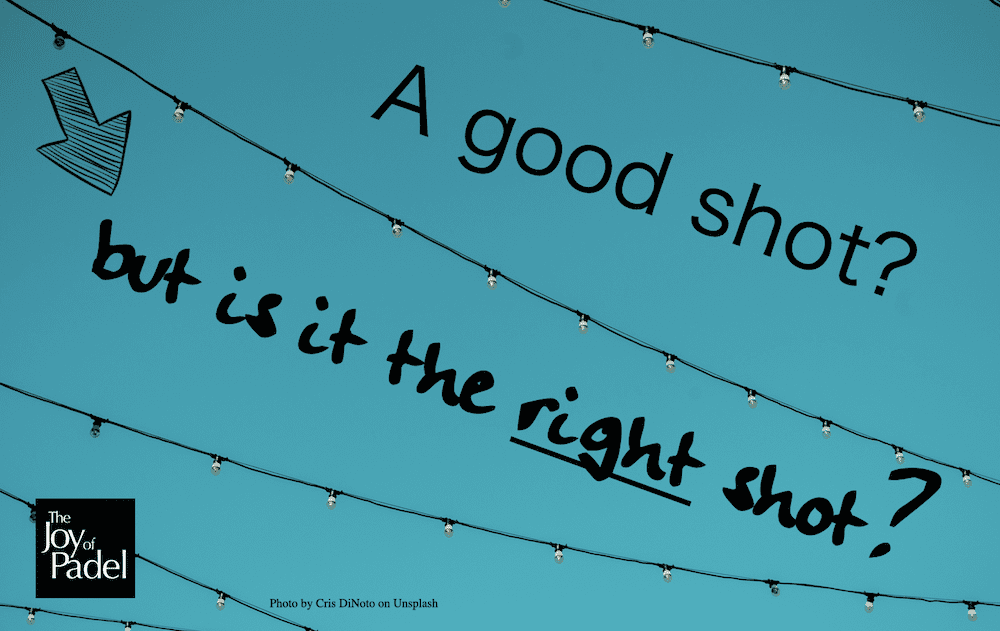Desired Behaviour over Result
I recently played a padel match and watched as my partner, for the umpteenth time, struck a ball full toss from the back court. The ball looked well on its way to hitting the wall directly (i.e. out). His shot went straight back to a player at the net. In the following quick fire exchange, ending with a crisp well-angled backhand volley, my partner won the point. Not wishing to entirely dampen the satisfaction of my partner, I quietly went over to remind him about the fact that volleying from behind the baseline was not the best way to play. To this, he retorted annoyedly, “Yeah, but we won the point.”
Moving from a Good Shot to the Right Shot…
The above scenario is similar to a situation where you hit a very risky shot that rather luckily lands in. One of my all-time favourite coaches, Gabo Loredo of Tasty Padel, would often say during our training sessions — with delicatesse — “ok, Minter, you hit a good shot, but it was the wrong shot.” It’s not about the result. It’s about learning how to play the game… better. Showing that you are willing and able to improve. It’s about tactics and shot selection. But many prefer to take the other route. Specifically, there are several players in my community who just can’t let go of the tempatation to volley (or half-volley) balls from the back of the court (i.e. beyond the serivce line). I know that such a shot can be useful in two instances (a) when you wish to take the people at net by surprise (and you’re gifted with fantastic hands); or (b) when you’re blocking a hard shot that you’re sure is going to be in and you’ll never be able to move forward fast enough to get the ball. The guiding “padel” principle, though, should be to let the ball bounce off the back wall, with the added benefit that perhaps the ball might have been out. That’s about setting the desired behaviour that, over time, will gain you much better results.
Exploring the Plasticity of the Brain

Credit: Gerd Altmann/ Pixabay
Similar to Gabo’s soft counsel, it’s better to learn to play well than focus on the immediate result. While the opportunist might say, better to be lucky than smart, I fundamentally believe that it’s better to spend your energies unlearning, rewiring and learning new shots. One must work on what and when to make the right shot, rather than hope to make the best-looking shot. Not only will it make your padel better, at a higher level, it’s about helping you to stay flexible, keep your brain vibrant, and keep finding ways to adjust the wiring of your brain. In other words, it’s about taking advantage of the plasticity of our brain.
If you’ve ever come across the best-selling book by Shane Parrish, “Clear Thinking,” you’ll recognise in my partner’s reaction a key fallacy in his thinking. Parrish talks about how,
“If we want to improve a skill, we need to know what exactly has to change and what might get us there. Otherwise, we plateau.”
–FS The Ultimate Deliberate Practice Guide
Practice is the key to improvement. In padel, it’s about figuring out the sequences, and in real time, figuring out how to select the right shot and placement. And in general, especially when the stakes are low, one should prefer to do the right thing, even if it means losing the point. In my podcast interview with US #1, Luis Estrada, he spent one year unlearning the temptation to strike the ball before it hits the wall. It meant a year of losses, but turned him into the number 1 in the U.S. That’s because he learned to play right shot rather than wishing to hit a highlight shot. As my cousin, Nallé Grinda engrained into me, and Chingotto has proven in the most recent FIP Sevilla P2 tournament (hitting just 15 unforced errors in five matches including against the number one seeds, Coello and Tapia), “it’s better to sorry about your unforced errors than happy about your winners.”
Your thoughts?












Great article. You only have to count points won by outright winners against those list my errors to know how true this is
My rule of thumb is to AIM for no more than 5 in one set…. That alone equals 1.25 games!